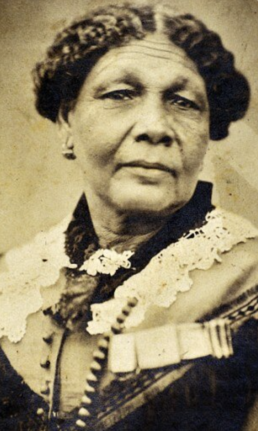These life stories may contain descriptions of childhood trauma and abuse, as well as images, voices and names of people now deceased. If you need help, you can find contact details for some relevant support services on our support page.
Jamaican-British nurse, Mary Seacole (1805-1881), was in foster care as a child.
Mary Jane Grant was born in Kingston, Jamaica. Her father was a Scottish soldier and her Jamaican mother ran a boarding house for invalid soldiers in Kingston while practicing traditional herbal medicine.
Mary was quite small when she went into foster care.
When I was a very young child I was taken by an old lady, who brought me up in her household among her own grandchildren, and who could scarcely have shown me more kindness had I been one of them; indeed, I was so spoiled by my kind patroness that, but for being frequently with my mother, I might very likely have grown up idle and useless (Seacole, p. 2).
Mary began to spend more time with her mother from the age of twelve when she would help her tend to the soldiers. Mary’s mother was a doctoress who specialised in herbal medicine. She encouraged Mary to also take up a medical profession.
Mary began travelling as a young woman, including to London. She married Edwin Seacole in Kingston in 1836. Edwin died six years later.
Mary built up a medical practice in her home, gaining her a reputation as “a skilful nurse and doctoress”. She was happy to learn from medical professionals she befriended.
Mary spent considerable time nursing in Panama during a cholera epidemic in the early 1850s. When she returned to London in 1854, Mary asked to be sent to the Crimean War to join Florence Nightingale’s group of nurses. She was refused, which Mary believed was due to racial discrimination.
Then, Mary funded her own trip and set up the British Hotel with a relative, Thomas Day, “to provide a mess-table and comfortable quarters for sick and convalescent officers” (Seacol).
Mary used mules to bring food, medicines and wine to battle frontlines at Sebastopol, Redan, and Tchernaya. By obtaining special passes, Mary was able to take care of injured soldiers on both sides of the war.
Mary returned to London penniless. In 1856, the media, supported by the Royal family and the British Army, campaigned to raise funds for her.
It was W.H. Russell, the first modern war correspondent, who made Mary Seacole famous. He described her as ‘a warm and successful physician, who doctors and cures all manner of men with extraordinary success. She is always in attendance near the battle field to aid the wounded, and has earned many a poor fellow’s blessings’ (Black History Month)
Mary’s autobiography, Wonderful Adventures of Mrs Seacole in Many Lands was first published in 1857. The book became a bestseller. Book proceeds and campaign funds enabled Mary to live comfortably in London until her death in 1881.
For many years Mary Seacole was better known in Jamaica than in England. The Jamaican Nurses Association named their headquarters in Kingston, Mary Seacole House, in 1954. There is also a residence hall at the University of West Indies named after her, and a ward in the Kingston hospital.
In 2004 Mary Seacole topped the 100 Great Black Britons poll in the United Kingdom. This was largely due to the efforts of the British African Caribbean community in bringing attention to Mary Seacole.
On 30 June 2016, a memorial statue of Mary Seacole was unveiled in the gardens of St Thomas’ Hospital.
References
“Mary Seacole (1805-1881).” BBC History website. http://www.bbc.co.uk/history/historic_figures/seacole_mary.shtml
“Mary Seacole”. Black History Month website. https://www.blackhistorymonth.org.uk/article/section/bhm-heroes/970/
“Mary Seacole Jamaican Nurse”. Encyclopaedia Britannica. https://www.britannica.com/biography/Mary-Seacole
“Mary Jane Seacole Biography.” Nursing Theory. https://nursing-theory.org/famous-nurses/Mary-Jane-Seacole.php
Seacole, Mary. (1988). Wonderful Adventures of Mrs Seacole in Many Lands. Oxford University Press.
Image available here.
